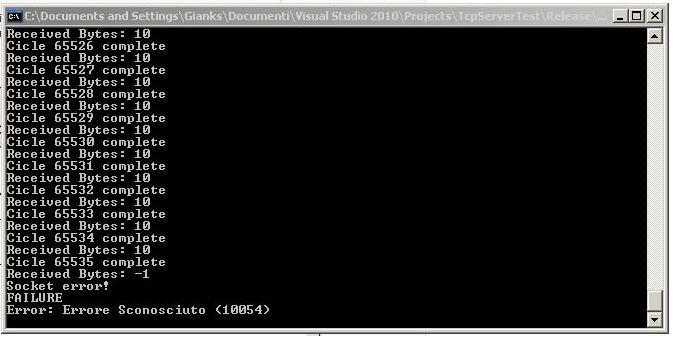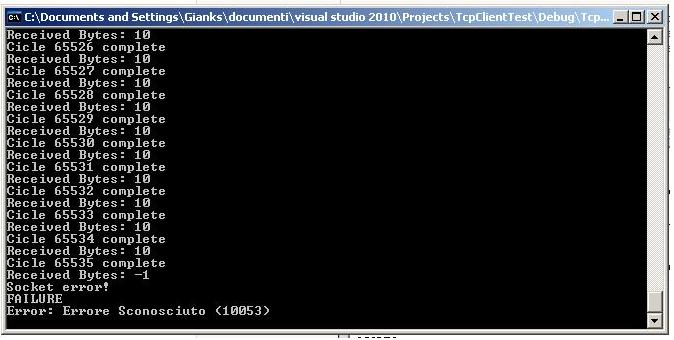Ciao a tutti,
mi trovo a scrivere sul forum dopo una settimana di tentativi... diciamo che ho cercato di non disturbare
Sto combattendo con la libreria winsock su Windows Xp e Windows 7.
Innanzi tutto ho scritto una semplice classe TcpSocket per lavorare ad oggetti con le funzioni di winsock.
Per effettuare i vari test di funzionamento e stress ho scritto inoltre due mini applicazioni, un client ed un server, che altro non fanno che mandarsi reciprocamente 10 bytes in modo alternato.
Sulla mia macchina con Windows Xp SP3, i due programmi lavorano senza problemi fino al ciclo 65535 ( non credo sia un caso questo numero...): a quel punto il client ottiene in lettura un errore WSAECONNABORTED (10053) causando la chiusura del socket, mentre il server ottiene un WSAECONNRESET (10054).
Su Windows 7 lo stesso identico problema avviene ben prima, ovvero al ciclo 16
Non capisco come possa lo stesso programma, connesso in localhost, riscontrare un problema di networking, costante a pari condizioni, ma diverso da OS ad OS.
Ho provato anche a far girare le due applicazioni alternatamente su due pc diversi ottenendo gli stessi risultati. Osservando con wireshark il traffico di rete, è possibile vedere che la macchian dove si verifica il WSAECONNABORTED invia un RST tcp senza un motivo apperente.
Vi allego i due screenshot delle due command line.
Se risulta utile, posso postare anche l'implentazione della classe TcpSocket.
Sono nelle vostre mani!
Vi ringrazio anticipatamente per l'aiuto!
Gianluca
This is the server code:
#include "stdafx.h"
#include "TcpSocket.h"
#define listenPort 9559
int _tmain(int argc, _TCHAR* argv[])
{
printf("TcpServerTest Started\n\n");
//STARTING LISTENING SERVER
TcpSocket socket;
printf(("Starting listening on port " + to_string((long long)listenPort) + " ... ").c_str());
if(!socket.Listen("", listenPort)){
printf(("FAILURE\nError: " + socket.errorString() + "\n").c_str());
Sleep(5000);
return false;
}
printf("OK\n");
//WAITING FOR INCOMING CONNECTION
printf("Waiting for incoming connection...");
TcpSocket * client = socket.Accept();
if(!client->IsValid()){
printf(("FAILURE\nError: " + socket.errorString() + "\n").c_str());
Sleep(5000);
return false;
}
char * outMsg = new char[10];
int outSize = 10;
int readData;
//STARTING CICLE
for(long long i = 1; i > 0; i ++){
//Creating & sending out message
if(!client->Write(outMsg, 10)){
printf(("WRITING FAILURE\nError: " + client->errorString() + "\n").c_str());
Sleep(500000);
return false;
}
//Reading reply
char * incoming = client->Read(readData);
if(readData == 0){
printf("\nConnection closed\n");
break;
}
if(readData == SOCKET_ERROR){
printf(("FAILURE\nError: " + client->errorString() + "\n").c_str());
Sleep(5000000);
return false;
}
delete incoming;
printf(("Cicle " + to_string(i) + " complete\n").c_str());
}
delete outMsg;
Sleep(5000);
return 0;
}
And This is the client code:
#include "stdafx.h"
#include "TcpSocket.h"
#define connectPort 9559
int _tmain(int argc, _TCHAR* argv[])
{
printf("TcpClientTest Started\n\n");
//STARTING LISTENING SERVER
TcpSocket socket;
printf(("Connecting on port " + to_string((long long)connectPort) + " ... ").c_str());
if(!socket.Connect("127.0.0.1", connectPort)){
printf(("FAILURE\nError: " + socket.errorString() + "\n").c_str());
Sleep(5000);
return false;
}
printf("OK\n");
int outSize = 10;
char * outMsg = new char[10];
//STARTING CICLE
for(long long i = 1; i > 0; i ++){
//Reading input message
int readData;
char * incoming = socket.Read(readData);
if(readData == 0){
printf("\nConnection closed\n");
break;
}
if(readData == SOCKET_ERROR){
printf(("FAILURE\nError: " + socket.errorString() + "\n").c_str());
Sleep(5000000);
return false;
}
delete incoming;
//Sending reply message
if(!socket.Write(outMsg, 10)){
printf(("WRITING FAILURE\nError: " + socket.errorString() + "\n").c_str());
Sleep(500000);
return false;
}
printf(("Cicle " + to_string(i) + " complete\n").c_str());
}
delete outMsg;
Sleep(5000);
return 0;
}
Last the TcpSocket header:
#pragma once
#pragma comment(lib, "Ws2_32.lib")
#include <winsock2.h>
#include <ws2tcpip.h>
#include <iphlpapi.h>
#include <stdio.h>
#include "TcpSocket.h"
#include <string>
using namespace std;
class TcpSocket
{
public:
TcpSocket(void);
~TcpSocket(void);
void Close();
bool Connect(char * address, int port);
bool Write (char* data, int length);
bool Write (wchar_t* data, int length);
char * Read(int & readBytes);
void SetSocket(int socket) { sock = socket; };
int Socket() { return sock; };
void SetBufferSize(unsigned int size);
bool Listen(char * address, int port);
TcpSocket * Accept();
bool isBlocking(){ return blocking_socket; };
bool setBlocking(bool);
bool hasReadyData();
bool IsValid(){ return sock != INVALID_SOCKET; };
string errorString(){ return errorMsg; };
int lastErrorCode(){ return errorCode; };
//int SendData (int sock, char * ptr, int length);
static string getErrorMessage(int errorCode);
private:
int sock;
int errorCode;
string errorMsg;
int bufferSize;
char * buffer;
int readyBytes;
bool blocking_socket;
fd_set * readSet,
* writeSet,
* exceptionSet;
timeval * timeout;
};
Allegati:
 7613_bf177dfd61d6c1eacd773226db97c626.jpg
7613_bf177dfd61d6c1eacd773226db97c626.jpg
 7613_78c9c362dd0f49f265107fc8347bd685.jpg
7613_78c9c362dd0f49f265107fc8347bd685.jpg